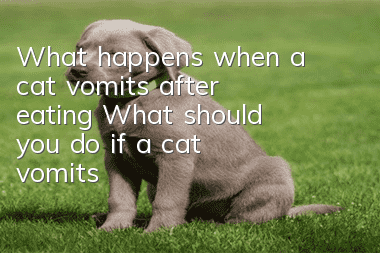What happens when a cat vomits after eating? What should you do if a cat vomits?

The phenomenon of vomiting in cats is relatively frequent and common, but it is so common that it is easily ignored by owners. For example, if you eat a little too much, you will vomit it up immediately due to indigestion. Vomiting in cats is a defensive phenomenon, vomiting to avoid danger. So why does a cat vomit after eating? Next, the editor will introduce it to you in detail.
Why does a cat vomit after eating?
1. The gastric mucosa is irritated
Vomiting is a common phenomenon for cats, rather than a disease. Vomiting is usually caused by strong stimulation of the gastric mucosa, which causes antiperistaltic contraction of the stomach. Vomiting is actually a protective reflex function of the body. , all to eliminate stimulation.
2. Licking fur causes vomiting
Because cats have the habit of licking their fur, they often lick their fur into their mouths and enter their stomach. These licked hairs form hair balls in the stomach. When they reach a certain size, they will stimulate the stomach and cause reflex vomiting, which is normal.
3. Vomiting caused by eating
Cats may also eat too fast, too much, or eat too much green vegetable food. Vomiting will also occur, which is also a type of physiological vomiting. After vomiting occurs, cats usually continue to eat as before.
Things to know about vomiting in cats
1. Pathological vomiting
If it is caused by illness Vomiting caused by factors is pathological vomiting. There are many pathological factors, such as viral, bacterial, parasitic, chemical and physical factors, etc. If it is caused by these factors, you must seek medical advice immediately. Send to hospital for treatment.
2. Distinguish between physiological and pathological conditions
When a cat is vomiting, the owner must distinguish whether it is physiological vomiting or pathological vomiting. Usually physiological vomiting is After vomiting, the cat will continue to eat, so you can ignore it. However, if the cat vomits frequently and has other abnormalities, it should be sent to the doctor immediately.
3. Pay attention to dietary care
Although vomiting is a very common phenomenon in cats’ daily life, in daily life, as long as there are many pairs of If you pay more attention to the cat's diet and care and take preventive measures, you can reduce the vomiting and allow the cat to grow up healthily.
Methods to prevent vomiting in cats
1. Prevent cold vomiting
During the change of seasons from winter to spring between,Temperatures of hot and cold are the most likely times for bacteria to breed. As long as the heat preservation work is not done properly, it will easily lead to cold vomiting. Therefore, it is necessary to keep the cat warm and use distilled water instead of tap water.
2. Indigestible vomiting
The intestines and stomachs of newly adopted kittens are not fully developed, and some have not even eaten cat food, so If you suddenly feed it cat food, it may become indigestible and cause vomiting. The preventive method is to feed the kitten milk powder, ginseng and some rice. Giving your cat some intestinal benefits from time to time can help regulate the gastrointestinal tract and promote gastrointestinal digestion.
3. Food allergy factors
For some cats with special physiques, some foods contain potential allergens, which usually occur after eating the usual food. Cats who do not eat food often will vomit several times a week, mostly within two hours of eating.
4. Prevent food allergies
Determining the allergens of cats is not an easy task. Foods that are usually likely to cause cat allergies include cereals, food colorings, chemical additives, preservatives, etc. It is best to exclude these foods that may cause allergies and feed them Give your cat a regular diet.
- How to raise a puppy that has not yet been weaned?
- What should dogs pay attention to in haze weather?
- Dog has black patches on his skin
- How to stop dogs from eating randomly
- How to train a beagle? When is the best age to start training a beagle?
- How to train a dog to be like a leader? Be sure to read these steps!
- What should I do if my golden retriever has diarrhea? What treatment is needed?
- What should I do if my dog eats something with maggots?
- What's going on when a dog rubs his face on the ground?
- Can a dog’s fever cause hepatitis?



